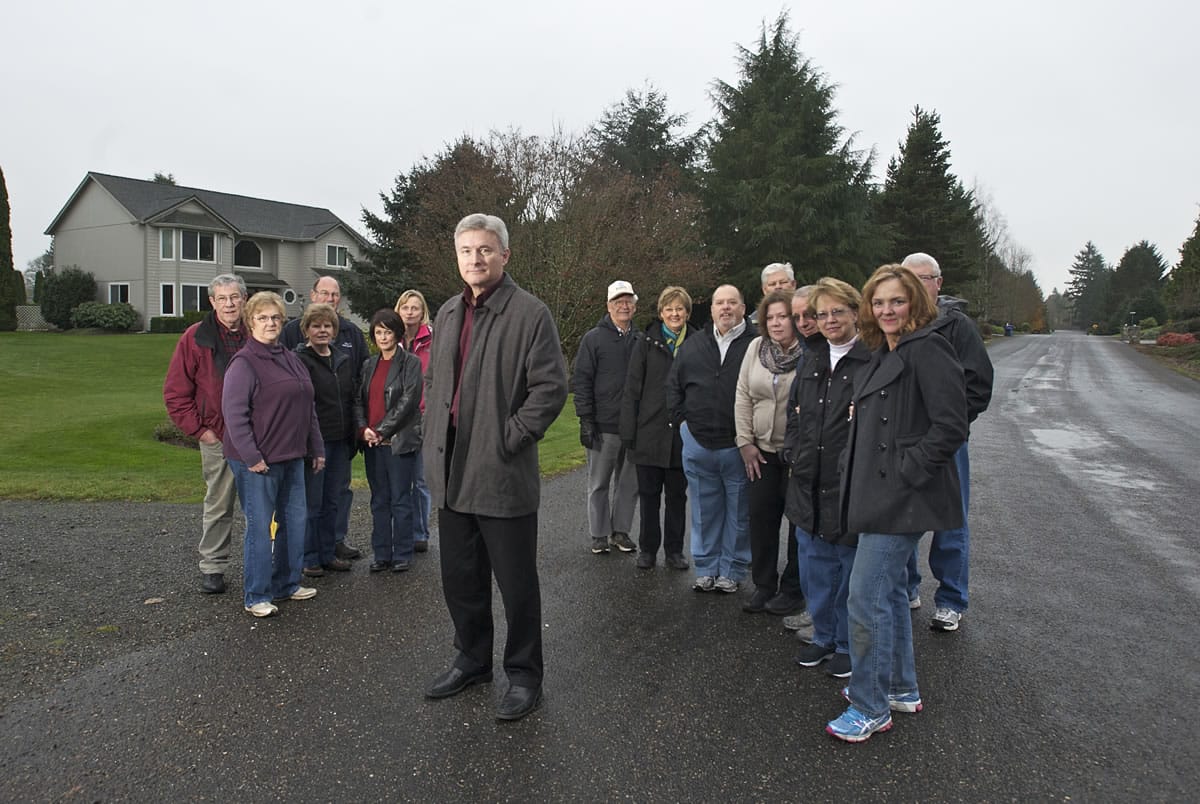BATTLE GROUND — James Schefers wants to distill hard liquor made from grain and fruit at his rural home near the East Fork of the Lewis River.
In his quiet neighborhood of Daybreak Demesne, people’s worries about the prospective distillery are working their way through the grapevine. Schefers’ application to operate a craft distillery on his 33-acre parcel elicited a spirited response among longtime residents.
“We just don’t want this to end up being a destination,” said neighbor Bruce Barnes.
Daybreak Demesne is a neighborhood of more than 40 homes in a rural cluster development. Schefers’ property is zoned agricultural, as is a 13-acre property across the street, while the rest of Daybreak Demesne is zoned rural, said county planner Terry Brooks.
Schefers points out that there are other permitted uses on his land that don’t require licenses and can be disruptive; having cattle, for instance, requires trucking in feed.
Schefers explains that he’s applying for the permit to distill alcohol as a hobby and doesn’t plan to launch a large-scale business or open up a tasting room. He’s retired, has 10 grandchildren and wants to work at his leisure. If the craft distillery, which he named Battle Crest, is successful, he would move it into town, he said. After neighbor complaints were forwarded to him from the Washington State Liquor Control Board, he distributed a letter throughout the neighborhood that outlined his intentions.
“I don’t want to bring truckers and tankers in, and I don’t anticipate that happening,” he said.
Residents worry that if the distillery is allowed to open up, it would set a precedent that alcohol establishments are welcome in the neighborhood. They fear that the house with the vineyard across the street, which was recently listed for sale, could be bought by someone trying to join the burgeoning Pacific Northwest winery industry.
A few years ago, the property owners planted grapes on their 13-acre parcel with the intention of setting up a vineyard and winery. The business never panned out and the homeowners never applied for a winery license.
The neighbors were upset back then, but now they don’t mind the vineyard; come summertime, the rows of grapes enhance the beauty of the neighborhood. Those landowners, Barnes points out, were in the neighborhood for a long time before they thought about opening a winery.
He surmises that if the Scheferses, who bought their home in May, had spent time getting to know their neighbors, everyone wouldn’t be so upset. Without much dialogue, people have jumped to their own conclusions and fear that Schefers’ top priority is launching a business, not being a good neighbor.
“We’re not here to pick on somebody,” said neighbor Larry Dykes. “We want a lot of information, so we can act appropriately.”
Neighbors are uncomfortable with the ambiguity and not knowing how a distillery in a rural setting would take shape. Many of the residents have lived in the neighborhood for at least two decades and hope to maintain the neighborhood’s idyllic country setting. Barnes moved to the neighborhood 10 years ago. He wanted his then-9-year-old son to grow up somewhere that offered the community of a neighborhood and quiet of the country.
“We’re sort of like family,” said Dykes’ wife, Sandra. “It’s not just a bunch of houses together. We care about each other.”
The issue has been brought up to Clark County commissioners for discussion.
Commissioner Tom Mielke lives about a mile away from Daybreak Demesne and visited the Scheferses at their home. Though he understands the reaction and concerns voiced by neighbors, he says their fears are unfounded.
For one thing, the 8,000-square-foot pole barn where the operation is supposed to be set up is not an engineered building. This means it doesn’t meet county building codes and can’t be opened to the public. Schefers said he plans to remodel the barn, which is rusty and has a leaky roof.
“I hope they understand that what I was going to do was going to be behind closed doors,” Schefers said.
And in any case, the county wouldn’t allow a tasting room that adversely affected neighbors.
“You’re assuming the worst-case scenario,” Mielke told about 30 neighbors who met at a local fire station to voice their concerns to the commissioner. The Scheferses were not invited. “We don’t know if he’s going to be successful.”
Schefers got approval from the county to apply for the craft distillery license and submitted his application to the Washington State Liquor Control Board. So far, Mielke said, Schefers hasn’t done anything wrong and doesn’t have the liquor license yet.
“You can’t stop somebody from doing something that he hasn’t done,” Mielke said. “I can’t arrest Bob for robbing the bank until he robs the bank.”
On Nov. 12, Carol Levanen, co-founder of Clark County Citizens United, a north county property rights group, spoke at the Clark County Board of Commissioners meeting about the concerns in Daybreak Demesne. She mentioned that the neighbors have considered seeking legal counsel to help suss out their options.
“While they may have some concern, there’s nothing wrong with what’s going on yet,” Mielke said, adding that he recently met with the neighbors. “I think that two-thirds of them understood that the application of a craft distillery limits what he can do.”
The commissioners explained that they do not have approval authority over state liquor licenses. Commissioner Steve Stuart understood the application as governing someone setting up a home business by making agricultural products into something to sell.
“People have a right to use their property how they will. Any property rights advocate would always advocate for people to be able to enjoy their property so long as they don’t infringe upon the rights of others,” Stuart said. “They’re not bringing in traffic. They’re not bringing in people that will be sitting at a bar and drinking and causing potential harm on the roadway.”
John Vissotzky, spirits master at the Double V Distillery in Battle Ground, agrees that these kind of operations are quite controlled and don’t create a raucous atmosphere.
“As far as it being a bar or a tavern or a party place, it just doesn’t happen,” Vissotzky said.
He adds that he had already invested more than $200,000 in distilling equipment before he even knew if his distillery would be approved. There are a lot of hurdles to the application process, which includes developing a business plan and acquiring most of the equipment. It can take a couple of years.
“I wish him a lot of luck,” Vissotzky said. “His real battle is going to be with the county and the zoning commission.”




